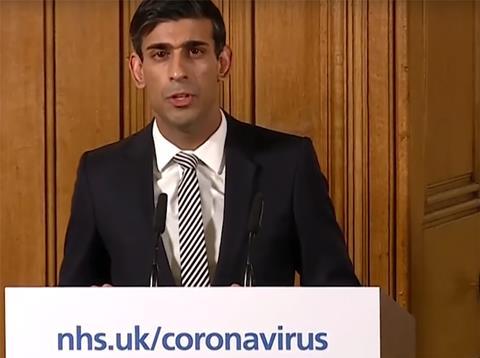Practices will fold, architects excluded from bailout warn

Architects are calling on the chancellor to urgently rethink his decision to exclude directors from the unprecedented support measures announced for staff and the self-employed.
The situation could cause “severe and permanent damage” to the profession, they warn in an open letter circulated this weekend [printed in full below].
“There is a real risk that this lack of support will lead to practices folding and the loss of jobs for both directors and any employees they may have,” wrote Mark Hatter, of north London-based Hatterwan Architects.
“As well as hardship for individuals and their dependants, there will be a loss of hard-earned professional skills, to the detriment of the construction industry as a whole.”
Responding to pressure, on Thursday the chancellor announced that self-employed workers would be paid 80% of their profits – up to £2,500 a month for three months – starting in June, a deal similar to that which he had already unveiled for employed staff.
There is a real risk that this lack of support will lead to practices folding
Mark Hatter
Rishi Sunak said the latest package would cover 95% of the self-employed, but it quickly emerged that thousands of people would fall through the net, including directors of limited companies. It is common practice for architects to structure their firms this way and to pay themselves a small salary with the rest in dividends.
Hatter said it was hard to understand why such a large group had been excluded from the help offered to others.
“We believe this will have a disproportionate effect on architects and their families, especially architects in small to medium practices,” he said in the letter sent to ministers, professional bodies and colleagues.
Ian McChesney, who worked at McAslan & Partners before setting up his own practice in 2001, tweeted: “Chancellor’s coronavirus bailout ignores many self-employed. Lots of architects affected by this including me. I’m a limited company too and sole principle. No help for me.”
@RIBA What about the very many small practices that are set up as limited companies? There is currently no support in place for Directors of those companies. Is the RIBA lobbying the Government on their behalf?
— Chris Hunt (@nichedesignarch) March 28, 2020
“People think being self-employed is an easy ride, and that we don’t pay taxes,” said Craig Marston of Shropshire-based Ke-design. “Far from it. We’re the backbone of the country and we don’t have the benefits of being employed. We work a very small profit margin and the buffer will run out quickly.” [Read Marston’s story in Building Design today.]
The RIBA’s benchmarking survey puts the average salary for the director of a two-person practice at £26,938 – almost half of the chancellor’s £50,000 threshold for assistance for other self-employed people.
Huge numbers of freelances in other industries are also affected by the omission with more than 132,000 people signing a petition on change.org calling for fair treatment of small limited company directors.
The Treasury has been contacted for comment. RIBA chief executive Alan Vallance issued a statement this afternoon in which he said: ”While the chancellor has provided significant financial support through the job retention scheme and self-employment income support scheme, it is clear this will not protect the incomes of all workers. We will continue to inform the government of the issues facing our members as we engage on a daily basis.”
Story continues below the letter.
The open letter
The below is an open letter. Please forward to anyone you think may be affected, anyone who can raise awareness, and anyone who may be able to lobby the government.
While the recently announced government assistance for self-employed workers is welcomed, their decision to exclude directors paid via dividends is a very concerning oversight. We believe this will have a disproportionate effect on architects and their families, especially architects in small to medium practices.
Due to the requirement for an architectural practice to carry professional indemnity insurance, it is common to set up as a limited company with one or more directors, who are consequently paid via a dividend from the company’s profits. Incomes for such directors are often modest, and well below the government’s £50,000 threshold for claiming assistance. The median income for a director of a 2-person architectural practice in 2019 was £26,938, (source: the RIBA’s benchmarking survey). This is substantially lower than the average 2019 UK salary of £36,611 (source: The Office for National Statistics). The title “director” is no guarantee of a large salary or assets that can be drawn upon in a time of need.
It is hard to understand why such a large group has been excluded from the reasonable and necessary assistance that has been offered to other self-employed people. At a time where social distancing, home working, remote schooling and self-isolation are reducing both the work available to architects and their ability to work effectively, there is a real risk that this lack of support will lead to practices folding and the loss of jobs for both directors and any employees they may have. As well as hardship for individuals and their dependants, there will be a loss of hard-earned professional skills, to the detriment of the construction industry as a whole.
It should relatively simple to extend the current self-employed assistance proposals to include directors. Typical income can be proven via filed self-assessment tax returns, and the source of dividends can be demonstrated via company accounts.
We ask that the government amends the current assistance package to correct this omission, and to support a profession that will otherwise be severely and permanently damaged.
Regards
Mark Hatter RIBA
Hatterwan Architects
London, NW2
Benni Allan, who runs a small Dalston studio called EBBA and previously worked with Niall McLaughlin, welcomed the chancellor’s packages but said: “These latest measures ignore many businesses where directors are paid through dividends.”

He said social distancing would inevitably impact on architects’ ability to win and deliver projects effectively.
“This is why there needs to be support in the short-term for those who need it,” he added. “This is to ensure practices can survive and are able to keep afloat in these uncertain times.
“This not only affects directors like me but also those who work for the studio. The profession needs to come together in times of crisis.”
Owain Williams who runs OWA and is head of projects at the Cass tweeted RIBA’s president, Alan Jones:
Hi @AlanJones2008- can you help small chartered practices with this please? Your membership is really vulnerable. Thank you https://t.co/AFWj73go1d
— Owain Williams (@OwainDHWilliams) March 29, 2020
















9 Readers' comments